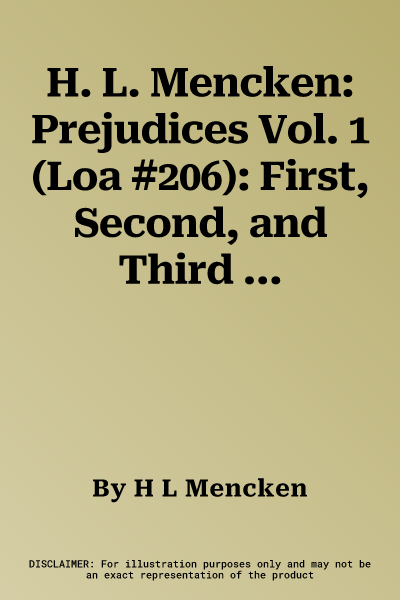H. L. Mencken was unquestionably the most provocative and influential
journalist and cultural critic in twentieth-century America. The six
volumes of Prejudices, published between 1919 and 1927, were both a
slashing attack on what Mencken saw as American provincialism and
hypocrisy and a resounding defense of the writers and thinkers he
thought of as harbingers of a new frankness and maturity. Laced with
savage humor and delighting in verbal play, Mencken's prose remains a
one-of-a-kind roller-coaster ride through a staggering range of themes:
literature and journalism, politics and religion, sex and marriage, food
and drink.
In this and a companion volume, The Library of America presents all six
series of Prejudices in their original form. The first three series
include some of his most famous writing, including "The Sahara of the
Bozart," an attack on Southern culture so unbridled as to earn him
widespread criticism from politicians and the press; "The National
Letters," a lively and free-spoken survey of writing in America; "The
Dry Millennium," an analysis of the multiple absurdities of Prohibition;
"Exeunt Omnes," an unblinking and deromanticized contemplation of death;
and "On Being an American," a humorous celebration of the political and
cultural panorama that he saw as "incomparably the greatest show on
earth." Here are his harsh summing-up of Theodore Roosevelt's career
("he didn't believe in democracy; he believed simply in government") and
his sympathetic portraits of literary friends like James Huneker and
George Jean Nathan. Mencken's account of the original reception of
Prejudices, from his memoir My Life as Editor and Author, is
included as an appendix.
Edmund Wilson wrote: "Mencken's mind . . . has all the courage in the
world in a country where courage is rare." That courage may sometimes
have been coupled with an inflexible stubbornness that led him into
positions hard to defend. But to succeeding generations of writers and
readers, Mencken was the figure who had risked charges of heresy and
sedition and almost single-handedly brought America into a new cultural
era. To read him is to be plunged into an era whose culture wars were
easily as ferocious as those of our own day, in the company of a critic
of vast curiosity and vivacious frankness.
LIBRARY OF AMERICA is an independent nonprofit cultural organization
founded in 1979 to preserve our nation's literary heritage by
publishing, and keeping permanently in print, America's best and most
significant writing. The Library of America series includes more than
300 volumes to date, authoritative editions that average 1,000 pages in
length, feature cloth covers, sewn bindings, and ribbon markers, and are
printed on premium acid-free paper that will last for centuries.

